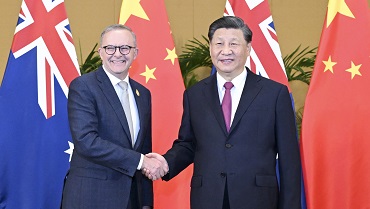The Australian Alert Service is the weekly publication of the Australian Citizens Party.
It will keep you updated on strategic events both in Australia, and worldwide, as well as the organising activities of the Citizens Party.
To subscribe to the Australian Alert Service, it's easy, and it's secure.
Lead Editorial
16 November 2022
Vol. 24 No. 46
In a time of crisis everything is up for grabs, ideology pales against reality and it is possible to shift deeply entrenched norms of behaviour. The gravity of simultaneous crises of the global economy and of strategic relations, which has brought us to the precipice of nuclear war, is forcing leaders of all stripes to sit up and take notice, and their assumptions are being challenged.
There are a number of important developments that could lead to breakthroughs. At the 15-16 November G20 forum in Bali, both US President Joe Biden and Australian Prime Minister Anthony Albanese met with Chinese President Xi Jinping. While Albanese in his press conference thereafter outlined the list of complaints he put to Xi, this doesn’t preclude the introduction of a more cordial spirit between the two leaders. Chinese reports say “There are no fundamental conflicting interests between China and Australia”, only deep mutual interests.
A 7 November Jakarta Post editorial ahead of the summit opened with Indonesian Foreign Minister Retno Marsudi saying that “The world is now on the brink of economic, military and security disasters and World War III is on our doorsteps”. She demanded that if leaders “are not willing or are unable to work together to address the world’s economic and security conundrum, at least they can lower their ego so as not to worsen the suffering of many people across the globe.”
As of this writing, a draft communiqué which includes a condemnation of Russia over its Ukraine intervention has not yet been approved; with many nations neutral or opposed, it is possible that no final declaration will be issued.
Developing nations, which have failed to be won over to Anglo-American plans for an alliance against Russia and China, are clamouring for inclusion in emerging multilateral platforms such as BRICS (Brazil, Russia, India, China, South Africa). The almost complete Jakarta-Bandung High Speed Railway, a joint project of Indonesia and China, confronted summit participants as a stark sign of the benefits of cooperation. At the 11 November Phnom Penh ASEAN (Association of Southeast Asian Nations) summit, host Cambodian Prime Minister Hun Sen called for leaders to embrace a “spirit of togetherness in upholding open and inclusive multilateralism, pragmatism and mutual respect in addressing the existential and strategic challenges we all face.”
In his three-hour-plus meeting with Biden, President Xi declared that “China-US relations should not be a zero-sum game where one side out-competes or thrives at the expense of the other. ... The world is big enough for the two countries to develop themselves and prosper together.” While Xi stressed cooperation, Biden hacked away at the old saw of competition, the refrain of neoliberal economists as defining the rulesbased order, telling Xi in an albeit mild sign of de-escalation that the two countries have a responsibility to “prevent competition from becoming anything ever near conflict”. National Security Advisor Jake Sullivan told media that “the United States is prepared for fierce competition with China but is not looking for conflict.”
The rules of the game are being challenged on all fronts, strategic and economic. At Senate Estimates last week, even Treasury Secretary Steven Kennedy made a case for intervention into Australian energy markets to restore price stability, as have mining companies. Chairman of mining giant Newcrest, Peter Tomsett told the Australian on 9 November that “We have every form of energy known to humankind in spades. And we haven’t been able to harness that into a coherent policy”, so intervention is required. Speaking at the Melbourne Institute on 2 November, Treasurer Jim Chalmers, calling himself a “reluctant intervener in markets”, said that “we have crossed a threshold” and therefore the government will consider intervening.
In other fiery Senate Estimates hearings several senators challenged the Reserve Bank of Australia’s failed approach to managing the current economic crisis (p. 3), showing that the door is wide open for the Citizens Party’s alternative economic development plans.
In this issue:
- Hold the RBA to the law, not inflation ‘snake oil’ prescriptions!
- Labor’s National Housing Accord is just another neoliberal fraud
- Will crypto crash spark financial chain reaction?
- This time both banks and corporations will blow up from derivatives
- Nuclear war cannot be won and must never be fought, cont.
- Ray McGovern: We can’t sit on our derrières
- The roots of the Taiwan conflict – Part Two
- The arrogance of the major banks is not going to be tolerated!
- RBA take note! O’Malley tells how to regulate credit
- ALMANAC: Inquiry into the project known as the Iron Boomerang - Part II
Click here for the archive of previous issues of the Australian Alert Service








